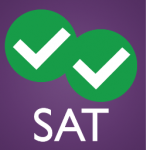 It’s Friday — late night. And you’ve yet to open it: the 1,000 page College Board SAT book. But you tell yourself, you’ll do some studying, before getting a few hours of sleep and wake up to take the SAT. You get halfway through a reading passage on something about the solar system, and you promptly fall asleep, only to be woken up an alarm at 7 a.m., your fate sealed: you go on to bomb the SAT.
It’s Friday — late night. And you’ve yet to open it: the 1,000 page College Board SAT book. But you tell yourself, you’ll do some studying, before getting a few hours of sleep and wake up to take the SAT. You get halfway through a reading passage on something about the solar system, and you promptly fall asleep, only to be woken up an alarm at 7 a.m., your fate sealed: you go on to bomb the SAT.
While it’s easy to laugh at the person in the opening paragraph, all too many students fall into the trap of putting the SAT of till the last minute. But when should you really start studying for the SAT? Clearly, the night before is, uh, procrastination at its finest. But don’t think a week of prep is going to make a difference. The SAT is a pretty grueling test, and you are going to have to give yourself at least a month of prep time if you are serious about raising your score by at least 100 points.
Of course you may have some objections. In fact, you probably have quite a few. So I’ve anticipated these objections below.
Objection #1: Uh, a month is like a long time.
I agree. But I’m not proposing you work on your singing skills so you can take part in your school’s talent show. Not to sound like a nagging parent, but the SAT has the potential to severely impact your future. How you do will determine which school you’ll go to. For some, those extra hundred or so points can be the difference between state school and the Ivy league, or community college and a good state school.
Objection #2: But I’m so busy with school and stuff.
The great thing with the SAT is it is not just administered once a year. From the beginning of Oct. to the beginning of June, you can take the SAT. I recommend finding a time of year when you don’t have too much going on. And what better time than summer? I know summer is about fun. But studying SAT a few hours a day for a month in summer leaves the rest of the day open for you to “summer” yourself silly.
If you start at the beginning of August (a good plan!), you’ll just have to make sure to maintain your SAT skills during the month of Sept. (a few one-hour sessions sprinkled throughout the week should do that).
Objection #3: I already took the PSAT and did pretty well without studying. Can’t I just walk into the SAT and get a similar score as I got on the PSAT?
As far as the SAT vs. PSAT goes, the two are almost identical in terms of content. However, the SAT is much longer and the environment far more stressful than what you experience during the PSAT. To avoid any surprises test day, you’ll want to make sure you are that much better at the SAT than you were at the PSAT. And the only way to ensure that is by dedicating at least a month of serious study to the SAT.
Objection #4: So if I have to study, where do I start? I’m not just going to buy every SAT book out there, right
Don’t worry. The best SAT books really come down to just a few. You need the College Board book, which has previous SAT in it. There is no better practice — question-wise — than the material you’ll find in this book: The Official SAT Study Guide.
For strategy, either Barron’s or Princeton Review should do.
Keep in mind that the material you use to prep can make a big difference test day. That said, you’ll probably only need a few books/resources. Just make sure you don’t crack them open for the first time the night before the test.
 This post was written by Chris Lele, resident SAT expert at Magoosh. For more advice on SAT prep, check out Magoosh’sSAT blog.
This post was written by Chris Lele, resident SAT expert at Magoosh. For more advice on SAT prep, check out Magoosh’sSAT blog.
> For more test prep help, check out NextStepU.com.



